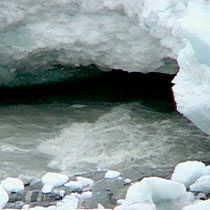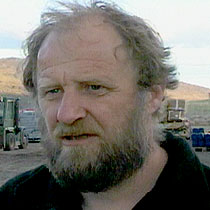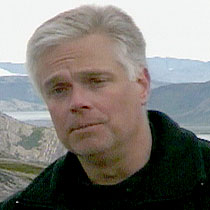2007年VOA标准英语-Greenland Ice Reveals Evidence of Global Warmin
搜索关注在线英语听力室公众号:tingroom,领取免费英语资料大礼包。
(单词翻译)
By Kane FarabaughKangerlussuak, Greenland
24 July 2007
Periods of global warming and cooling have caused the terrain2 of Greenland to change over time -- part of the natural process of the Earth's evolution. But as VOA's Kane Farabaugh reports, scientists who work in Greenland are concerned that evidence they are finding today in the ice indicates that mankind could be causing a change in Greenland's natural evolution -- for the worse.

Greenland's glaciers show evidence of global warming
Eighty-five percent of Greenland, the world's largest island, is covered in ice. It is also home to ten percent of the world's ice mass.
The Jacobshaven Glacier1, at nine kilometers a year, it is currently the world's fastest-moving glacier. Historians and scientists believe this mass of draining ice produced the iceberg3 that sunk the Titanic4 ocean liner in 1912. It is also a glacier that could contribute to sinking coastlines of major countries if it were to melt completely.
Greenland is the fastest-warming location on the planet. The average temperature here is four degrees Fahrenheit5 warmer than it was a decade ago. If continued warming caused most of Greenland's ice to melt, sea levels would rise roughly 20 feet [six meters]. Scientists looking at satellites believe southern Greenland is currently losing 25 cubic miles [104 cubic kilometers] of ice per year.
These statistics have placed Greenland at the center of the global warming debate.
 |
| Jorgen Peter Steffensen |
In Kangerlussuak, the hub of scientific activity in Greenland, Steffensen is preparing for a summer on Greenland's ice sheet. He studies cross sections of the packed ice -- called ice cores -- that he gathers from drilling deep inside the ice sheet. "So whatever falls as snow on the ice cap never goes away. It just piles up. And therefore, the ice cap, the massive ice you have covering Greenland, is a beautiful layer cake of snowfall upon snowfall nicely piled up over the eons."
Summit is the tallest point in Greenland. It sits on top of 3,300 meters of ice. It is 400 kilometers from land. It is one of several locations where ice core samples are gathered.
In this barren, frozen expanse, scientists like Roger Bales take advantage of the pristine6 conditions to gather data that will help other scientists, like Steffensen, understand the evidence in the ice core samples. "This is a very clean station. As you know, there's pollution in cities but there's also global pollution, so we come here to one of the cleanest places in the Northern Hemisphere to really understand what's happening globally."
What is happening globally over the years is that the temperature is rising. Summit ice core samples give scientists an idea of how fast the ice melted during certain periods, and how much carbon and gas was in the atmosphere when the snow fell.
It might be hard to fathom7 that the planet is getting warmer -- while standing8 in sub-zero temperatures in one of the coldest places on Earth.
 |
| Greg Huey |
What is not conclusive9 is whether or not mankind is responsible.
"I don't think that the concept of global warming -- it's not controversial in the scientific community. It's here -- people might argue about how fast it is or what steps to take, but no one argues that greenhouse gas emissions10 and the planet is warming, and unless we want to live in a very different climate for our children and grandchildren we're going to have to do something about the carbon in the atmosphere," says Huey.
Steffensen adds, "To filter out whether this present warming is a natural variation or is man made -- that is impossible. But if there is a very strong correlation11 between our emissions and the heating we see today, so do we dare not to?"
Much of the research being conducted in Greenland today helps provide sound, scientific evidence to lawmakers and leaders around the world.
"We want people to know that the atmosphere is changing. We are, we have these global atmospheric13 measurements and the evidence is solid for that. It provides I think a sound basis for decision makers12 on which to base mitigation measures," Bales adds.
But what scientists like Steffensen fear most is the unknown. "Instead of a gradual warming, we could have something terrible happen. And the worst thing we would like now, with six billion people in the world, is unpredictability. That would be the worst. That is what I fear -- is the unpredictability, and it could be triggered by our actions."
 收听单词发音
收听单词发音 




